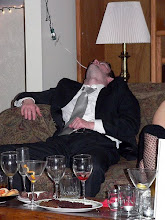Stop me if you've heard this one: a master criminal, whose name is a play on words, plans the crime of the century, and the only person standing in his way is a stalwart defender of truth and justice, who happens to have just about the most tricked-out car in the world.
Just over a year separate the release of Goldfinger in the United States and the premiere of 1966 Batman TV series. The pair of them arrived on the heels of Susan Sontag's "Notes on Camp," published in the preceding year, which brought to mainstream attention an aesthetic that would define both that TV series and the James Bond franchise. Roger Moore gets a lot of guff from Bond purists for the amount of camp his entries indulged in. Clearly, those purists must be misremembering Pussy Galore's Flying Circus, and the raft of old-timey gangsters Auric Goldfinger recruits for his attack on Fort Knox.
Goldfinger is awash with iconic moments. Oddjob and that hat of his. The laser drill scene. The Aston Martin pulling out all the stops: water jets, guns, ejector seat. Pussy Galore and her silly name. It says something that James Bond, whose name was picked by Fleming because it was so forgettable and unremarkable, should constantly run into people with names like Plenty O'Toole and Holly Goodhead and a guy who finds gold so nice he was named for it twice.
The film is in fact a kind of a reverse heist movie, at least from Bond's perspective. He stumbles on to the thing after the planning has been done, after Goldfinger has brought his supplies in from different parts of the world, cleverly disguised, after the villain has recruited Ms Galore and her aviatrix squadron and planned his assault on the base in meticulous detail. We even get a scene where Goldfinger explains the whole thing, though, rather than the cliched "Bad Guy Explains The Plot To The Hero" business, it's him explaining the robbery to those gangsters, who from their own perspective thought they were in a crime film until the walls of Goldfinger's den start moving around and they realize they've stumbled into a James Bond picture.
That is, of course, before the eponymous bad guy murders them all, having got what he wanted. I guess that's the difference between when a good guy plans a heist and a bad guy plans a heist. Before his little killing spree, and right as the landscape in his den changes from "man cave" to "supervillain control room," Goldfinger explains that "Man has climbed Mount Everest, gone to the bottom of the ocean. He's fired rockets at the Moon, split the atom, achieved miracles in every field of human endeavor...except crime!"
Seriously, whose rogues gallery could that possibly remind you of?
But as far as Bond might stray from his roots, the character is fundamentally less elastic than Batman. With the exception of the murder of Thomas and Martha Wayne, which virtually every reiteration of the character across media sees fit to re-stage (one notable exception: Batman '66) Batman creators feel no particular obligation to recreate classic elements. Whereas the Bond franchise is more burdened by its own tropes. This film, as iconic as it is, casts a long shadow. Goldfinger is where all the elements that would come to define the franchise for decades are finally present and humming along beautifully. Which means, however, that it casts a shadow so large it is difficult for the character ever to entirely escape.
 |
| "Camp is the consistently aesthetic experience of the world. It incarnates a victory of 'style' over 'content,' 'aesthetics' over 'morality,' of irony over tragedy." |







No comments:
Post a Comment